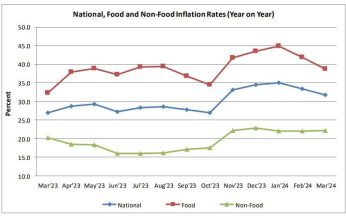Malawi’s central bank rules out LRR cut
 The Reserve Bank of Malawi (RBM) has ruled out any possibility of cutting the Liquidity Reserve Requirement (LRR) from the current 15.5 percent as proposed by some money market analysts.
The Reserve Bank of Malawi (RBM) has ruled out any possibility of cutting the Liquidity Reserve Requirement (LRR) from the current 15.5 percent as proposed by some money market analysts.
RBM Governor Charles Chuka has argued that revising downwards the LLR now could backfire by fostering the growth of money supply in the economy which, he said, is inflationary.
LLR is most often used as a monetary policy tool for influencing the country’s borrowing and interest rate by changing the amount of funds available for a bank to lend out.
 “We cannot interfere with this policy framework. It can create room for more credit in the private sector. We want to contain growth of money stock at the moment,†said Chuka last week at a cocktail organised by the Association of Business Journalists (ABJ) in Lilongwe.
Every commercial bank is obligated to hold minimum reserves for its customer deposits in form of cash which is physically stored at the central bank called LRR.
In Malawi, for every K100 deposited at the bank, K15.50 goes to the RBM and stays idle, leaving the commercial bank to transact with the remaining K84.50.
However, money market analysts have been pressing the central bank to consider cutting the LLR to help stressed banks have more cash and normalise their balance sheets.
Alliance Capital Limited chief executive officer James Chikavu Nyirenda said in July that Malawi’s LRR, which has been static at 15.5 percent for some time, is one of the highest in the entire Southern Africa Development Community (Sadc), which has an average LLR of 10 percent.
“We might see the RBM lowering this [LRR] in line with the region as one way of mitigating the bank’s liquidity positions,†he said.
But Chuka said much as the cutting of LLR could help ease the liquidity problems facing some banks, the monetary policy measures being pursued at present continue to bear fruits, arguing that most banks are out of the discount window borrowing.
“We don’t reward bad management [in the banking sector], but at the same time we don’t want them to close,†he said.
Meanwhile, Monetary Policy Committee (MPC) of RBM met last Wednesday and decided to maintain the bank rate at 21 percent.





